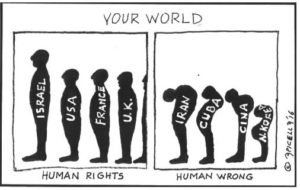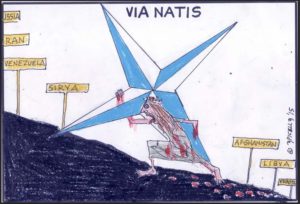 “Now is the winter of our discontent
“Now is the winter of our discontent
Made glorious summer by this sun of York…”
King Richard III, act 1, sc. 1
Five years elapsed since the first of the widely acclaimed “Arab Springs”, though it does not seem that long, as the inaudible and noiseless foot of time (1) conceals its own advance. By the way, the name, Arab Spring, comes from the US “Foreign Policy Magazine” (nomen omen).
At the onset, the first spring – in Tunisia – resembled the uncertain glory of an April day (2). But given the aftermath it’s fair to say, “Back foolish expectations, back to your native spring.” (3)
We could ask those subjected to the “Arab Spring treatment” if, in its wake, they have been removed from misery and delivered to a life of soft vicissitudes of pleasure and repose. Setting aside the millions who cross the Mediterranean, thus ignoring the blessings bestowed on their homelands by their own colored revolutions. The refugees, for sure, do not seek refuge because pleasure has ceased to please.
And though astute observers predicted it, clearly those “springs” were not spontaneous and were foredoomed to futility. Futility, that is, for the assumed beneficiaries. For them, the colored revolutions have produced the only conclusion which they were intended to prevent, a strengthening of barbarism, martial laws, military or mercenary rule and bloodshed. While the puppet-masters, of course, laugh all the way to their respective and proverbial banks.
Revolutions, as we know, cannot be made with the help of the police. It follows that, barring extremely rare exceptions and circumstances, revolutions must be organized and financed.
Enter the new organizations specialized in the export of democracy. They were active way before the young unemployed Mohamed Bouazizi (his name now sunk into the wide gulf of blind forgetfulness and dark oblivion, (4)), burned himself alive, thus triggering the Tunisian “spring.”
It is a property of the society of the spectacle to extract anecdotal details from an event, and build them up as if they were its most important elements. In the instance, the media-pushed narrative has promoted the notion that smartphones, tweets and text messages were the tools without which no color revolution would have been possible. In turn, as these devices are considered the hallmark of current youth, it follows that the young were the actors, the doers and the promoters of democracy in their respective countries.
Calling this explanation a distortion of the truth is a euphemism. The cyber-activists had been set-up, financed and groomed by US organizations specializing in the export of democracy, such as USAID, NED, Freedom House and the billionaire George Soros’ Open Society – plus think-tanks staffed by sundry academics, who have been broken on the wheel of university subservience to the ruling class.
In the countries to be democratized, the chasm between the governors and the governed further facilitates(ed) the (paid) task of those who promise the cyber-activists the opportunity to “be someone.”
A forerunner of these operations was the notorious OTPOR, established in Serbia in 1988, to gnaw from within at the fabric of Yugoslavia. In the instance, OTPOR did not succeed and the cavalry had to intervene, in the shape of the US/NATO bombardment of Serbia (1500 dead) and the attendant destruction of Serbian infrastructure.
Now OTPOR has morphed into CANVAS (Centre for Applied Non Violent Actions and Strategies), which defines itself as “Non-profit, non-governmental, oriented towards educational work.” I heard one of its members boast, on a European TV Station, that CANVAS can organize a democratic revolution anywhere at costs varying from 200,000 to 400,000 $. Which is probably true – considering that just now, for example, Jeb Bush, in Iowa, spent more than 3,000 $ on each voter whose vote he got.
The young constitute the most fertile soil for Arab Springs – especially if orange revolutions suggest or promise future welfare, some immediate small cash, a pizza or two, and the inherent pleasure of goliardic mayhem and party fun. In the circumstances, ideology is marginal at best. As a character says in King John,
“Well, whiles I am a beggar, I will rail
And say there is no sin but to be rich;
And being rich, my virtue then shall be
To say there is no vice but beggary.” (5)
Few lines sum up so well all political action, no matter whether pundits, politicians and pontificators may claim otherwise.
Besides, the cyber-dissidents, in their youthful enthusiasm, consider the revolution completed once the current government resigns. The old regime gone, the aftermath is irrelevant.
It is clear that the “Springs” and their results have nothing to do with the slogans proudly uttered by the cyber-activists. And that these democracies, to use Polonio’s definition, are but “springes to catch woodcocks.” (6)
Readers will no doubt have noticed that the only Middle Eastern nations subjected to the Arab Spring treatment are actually secular republics. Clearly all Arab monarchies are sanctuaries of democracy, freedom and human rights. Including Saudi Arabia, where political opponents are beheaded, adulteresses stoned, thieves’ limbs cut off, and women cannot drive.
A naive observer may conclude that the “Arab Springs” have been a failure. But were they really? It depends. The Odeon Yinon plan, drafted in the 1980s and named after its Israeli-Zionist author, proposes the “dissolution of all the existing Arab States, and the remodeling of the region into small entities, fragile, brittle, coercible, and incapable of offering Israel any resistance”. On these grounds, who can claim failure?
Even less known is the Kalergi plan – the founder of the European Union, who in his plan says, “The (European) man of the future will be of mixed race. Today’s races and classes will disappear owing to the disappearing of space (nations), time, and prejudice. The Eurasian-Negroid race of the future, similar in its outward appearance to the Ancient Egyptians, will replace the diversity of peoples with a diversity of individuals.”
Given that there won’t be any likely mechanism with which to return the migrating millions to their land of origin, who will deny that the Yinon-Kalergi plans fit hand-in-glove with each other? And that they have been a complete success?
In the meantime, what happened in Tunisia, site of the ground-breaking experiment in “Arab Springs?”
The country obtained the Nobel Peace prize – which, given who else got it in recent years, is not an endorsement.
Commenting on this fifth anniversary we read on Tunisian blogs, “We are the only democratic country in the Maghreb, plus we have the Nobel Prize. Everything else is worse than at the time of Ben Ali.” (Ben Ali being the hyper-corrupt previous ruler). What the bloggers mean is that the bubble that sparkled before the cyber-activists has become common water to the touch, and the phantom of democracy vanished when they wished to touch it.
As if to illustrate the point, a young unemployed Tunisian graduate just killed himself to protest against favoritisms in assumptions, the same plague denounced by the cyber-activists of 5 years ago and by the unemployed young man who then burned himself alive.
 In the meantime, as of 2011, Tunisia is the prime exporter of Islamist-terrorist manpower, in Libya and Syria. Next target of an Arab Winter, in the making and in the eyesight of US/NATO, is Algeria.
In the meantime, as of 2011, Tunisia is the prime exporter of Islamist-terrorist manpower, in Libya and Syria. Next target of an Arab Winter, in the making and in the eyesight of US/NATO, is Algeria.
In Tunisia, according to non-embedded analysts, even more than during the times of the deposed Ben Ali, the country is totally submissive to the interests of foreign and private capital, thanks to NATO and ALECA (a French acronym for literally, “Free, Complete, and Profound Agreement of Free Trade.”)
And according to the statistics on social indicators, there is increase in illiteracy, homelessness, poverty, unemployment, concentration of wealth, plus the slow death of agriculture and of the national industry.
For the Tunisians who do not cross the Mediterranean in motorized rafts, futurity is the proper abode of hope.
Knowing what we know, and after watching, on live TV, the wholesale destruction of entire nations where democracy was exported, we can conclude by partially adapting Shakespeare’s famous lines on sex and say,
“All this the world well knows yet none knows well
To shun this democracy that leads men to this hell.”(7)
- All’s Well that Ends Well
- Merchant of Venice
- from Romeo and Juliet
- Richard III
- King John
- Hamlet
- Sonnet 129
In the Play, opening quote. Richard III reflects on the events that have brought temporary peace to the Kingdom, during the 30-year War. A situation that does not bode well for his Mephistophelian plans.
Image Source. Cartoon courtesy of “Apicella”, United Kingdom
